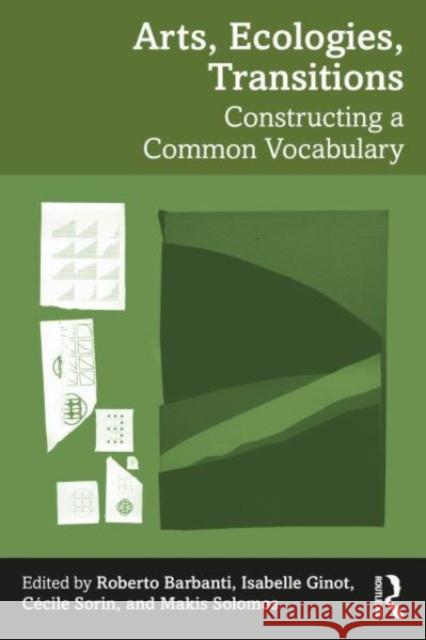Arts, Ecologies, Transitions » książka



Arts, Ecologies, Transitions
ISBN-13: 9781032595153 / Twarda / 2024 / 248 str.
Arts, Ecologies, Transitions
ISBN-13: 9781032595153 / Twarda / 2024 / 248 str.
(netto: 723,00 VAT: 5%)
Najniższa cena z 30 dni: 654,86
ok. 22 dni roboczych.
Darmowa dostawa!
Arts, Ecologies, Transitions provides indepth insights into how aesthetic relations and current artistic practices are fundamentally ecological and intrinsically connected to the world. As art is created in a given historic temporality, it presents specific modalities of productive and sensory relations to the world.
Wydanie ilustrowane
Preface
Roberto Barbanti, Isabelle Ginot, Makis Solomos and Cecile Sorin
Introduction
Roberto Barbanti, Isabelle Ginot, Makis Solomos and Cecile Sorin
1. Acoustic Ecology
Kostas Paparrigopoulos
2. Aesthetic Subjectivation
Roberto Barbanti
3. Aisthesis
Carmen Pardo Salgado
4. Alienation
Eric Lecerf
5. Animal
Baptiste Morizot
6. Anthropocene and Aesthetics (The)
Matthieu Duperrex
7. Architecture
Philippe Chiambaretta
8. Art and Milieu (Works of)
Yann Aucompte
9. Art in Common
Estelle Zhong Mengual
10. Biodiversity: An Aesthetic Emergency
Joanne Clavel
11. Cinema
Damien Marguet
12. Co-creation: Collective, Participatory, and Immersive Art
Alice Gervais-Ragu
13. Collapsonauts
Yves Citton and Jacopo Rasmi
14. Contemporary Dance
Joanne Clavel
15. Decoloniality
Nathalie Coutelet
16. Degrowth
Kostas Paparrigopoulos and Makis Solomos
17. Digital Creation
Anne-Laure George-Molland and Jean-Francois Jego
18. Documentary Arts
Soko Phay
19. Ecocriticism and Ecocinema
Cecile Sorin
20. Ecofeminism
Frederick Duhautpas
21. Ecofeminist Territories
Tiziana Villani
22. Ecosomatics
Marie Bardet, Joanne Clavel and Isabelle Ginot
23. Garden (The)
Gilles Clement
24. Geography and Aesthetic Production of Ecological Issues
Joanne Clavel, Clara Breteau and Nathalie Blanc
25. Graphic Design
Yann Aucompte
26. I for Iconoemic
Giusy Checola
27. Landscapes, Territory, and Urbanism
Alberto Magnaghi
28. Learning and Experience
Anastasya Chernigina and Antoine Freychet
29. Literature and the Commons
Remi Astruc and Thierry Tremblay
30. Literature(s)
Aline Berge
31. Memory and Choreographic Works
Isabelle Launay
32. Music
Carmen Pardo Salgado and Makis Solomos
33. Musical Performance and Wet Markets
Pavlos Antoniadis
34. Performance
Helene Singer
35. Pest Plants
Lorraine Verner
36. Photography
Michel Poivert
37. Place
Augustin Berque
38. Plastic Arts
Lorraine Verner
39. Recycling
Gala Hernandez Lopez
40. Site Specificity
Lorraine Verner
41. Socially-Engaged Art
Isabelle Ginot
42. Sound and Sound Milieus
Makis Solomos
43. Sound Art
Susana Jimenez Carmona, Carmer Pardo Salgado and Matthieu Saladin
44. Technology and Economy of Means
Agostino DiScipio
45. Territory
Ludovic Duhem
46. Theatre
Eliane Beaufils and Julie Sermon
47. Transitory Urbanism
Fabrice Rochelandet
48. Visual
Claire Fagnart
49. Walking Art
Antoine Freychet and Anastasia Chernigina
Bibliography
Roberto Barbanti is Emeritus Professor in the Department of Visual Arts at the Université Paris 8 and a member of the AIAC research unit. He cofounded and co-edited the journal Sonorités (2006-2017) and is an advisory board member for the publisher Eterotopia France. His research areas cover ecosophy, sound ecology, and contemporary art. His publications include: Les limites du vivant (co-edited with Lorraine Verner, 2016), Dall’immaginario all’acustinario. Prolegomeni a un’ecosofia sonora (2020), and Les sonorités du monde. De l’écologie sonore à l’écosophie sonore (2023).
Isabelle Ginot is Professor of Dance Studies at the Université Paris 8, and co-founder of the association A.I.M.E. Her two main areas of research intersect with issues of vulnerability and difference in dance. The first addresses dance performance analysis and criticism, and focuses on artists with disabilities who perform on stage. The second analyses practices, especially practices (workshops, performances, participatory art) with “non dancers” who have disabilities, are aging, or are affected by social discrimination and exclusion. From 2010 to 2019, she chaired the research group Soma&Po, developing research and practices on the political and social uses of somatic practices. Currently, she runs a practice-based seminar titled “Mouvements engagés” (Engaged moves), a peer-led workshop that shares dance practices in French care institutions. Lastly, she investigates alternative formats for academic research, involving the participation of artists, activists and non-scholar actors.
Solomos Makis was born in Greece and living in France, Makis Solomos is Professor of Musicology at the Université Paris 8 and director of the research unit MUSIDANSE. He has published many books and articles about new music. His main areas of research are the focus on sound, the notion of musical space, new musical technics and technologies, the mutations of listening, and the ecology of sound. His book From Music to Sound: The Emergence of Sound in 20th- and 21st-Century Music (Routledge, 2019) deals with an important change in today’s music. His latest book Towards an Ecology of Sound: Environmental, Mental and Social Ecologies in Music, Sound Art and Artivisms (Routledge, 2023) addresses an expanded notion of ecology, mixing environmental issues and socio-political questions. He is also one of the main Xenakis specialists, to whom he devoted many publications. For Xenakis’s centenary (2022), he co-organized the Xenakis22: Centenary International Symposium and he is the editor of Révolutions Xenakis (Éditions de l’Œil – Philharmonie de Paris, 2022).
Cécile Sorin is currently Professor in the Department of Cinema at the Université Paris 8. After having published books on practices of parody and pastiche in cinema (Pratiques de la parodie et du pastiche au cinéma, 2010) and Pasolinian pastiche (Pasolini, pastiche et mélange, 2017), she is currently examining processes of subjectivation in Pasolinian cinema and contemporary French cinema. Her recent work reassesses Pasolini work through the prism of ecopoetics. In addition, she is co-editor of the Esthétiques hors cadre series from Presses Universitaires de Vincennes.
1997-2026 DolnySlask.com Agencja Internetowa
KrainaKsiazek.PL - Księgarnia Internetowa









